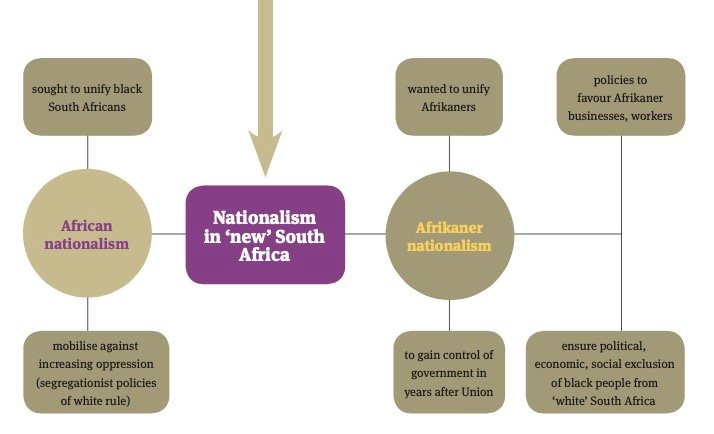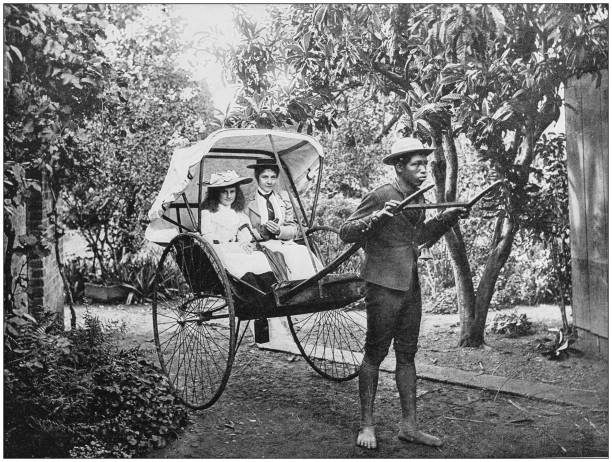On this page you will read about “The rise of Afrikaner and African Nationalism”, which will significantly assist you as a guide when you prepare for your Grade 11 History. On this page, most of the key events and crucial points are presented.
Also read: The social and economic impact brought about by the natives land act of 1913
Afrikaner and African Nationalism Grade 11 Essay Key Points
British Colonies in South Africa
- No South Africa before 1910
- Britain defeated Boer Republics in South African War (1899–1903)
- Four separate colonies: Cape, Natal, Orange River, Transvaal colonies(which are ruled by Britain and needed support of white settlers in colonies to retain power).
Union of South Africa
- In 1908, 33 white delegates met behind closed doors to negotiate independence for Union of South Africa
- Views of 85% of country’s future citizens (black people) not even considered.
- British wanted investments protected, labour supplies assured: agreed to give political/economic power to white settlers
- Union Constitution of 1910 placed political power in hands of white citizens
Cape Province
- small number of educated black, coloured citizens allowed to elect few representatives to Union parliament
- only whites had vote
New Nation
- settler nation’ = no room for blacks with rights
- white citizens called selves ‘Europeans’
- all symbols of new nation = European, e.g. language, religion, school history
- African languages, histories, culture seen as inferior
Racism in the new nation:
- Africans seen as members of inferior ‘tribes’
- could practise traditions in ‘native’ reserves
- in settler (white) nation = required only as workers in farms, mines, factories owned by whites
- black people denied political rights, cultural recognition, economic opportunities.
1910 → large numbers of black South African men forced to become migrant workers on mines, factories, expanding commercial farms.
1913 Natives Land Act → worsened situation: land allocated to black people by Act = largely infertile, unsuitable for agriculture.
Land Act, segregation policies (including in work and economy) and World economic depressions (Great Depression that started in USA) resulted in forced migration of people (blacks and white) in South Africa in the 1920s, 30s, 40s. 1 000s of poor white + black tenant farmers forced off land, into cities:
– some = domestic workers/worked in industry
– did not have such strong ties to old rural/ethnic identities
– two forms of nationalism emerged in SA: African Nationalism and Afrikaner Nationalism

View all Grade 11 History Study Resources here
A Guide on How to Write the Rise of Afrikaner and African Nationalism Essay
To write an essay on the rise of Afrikaner and African Nationalism, follow these steps:
- Introduction:
- Provide a brief overview of the historical context leading up to the rise of Afrikaner and African Nationalism.
- Introduce the British colonies in South Africa, the South African War, and the Union of South Africa.
- British Colonies in South Africa:
- Explain the situation in South Africa before 1910, when there was no unified South Africa.
- Discuss the outcome of the South African War and the formation of the four separate colonies (Cape, Natal, Orange River, Transvaal).
- Formation of the Union of South Africa:
- Describe the process that led to the creation of the Union of South Africa, including the 1908 meeting of white delegates.
- Explain how the views of the black majority were ignored and how political and economic power was given to white settlers.
- Union Constitution and Cape Province:
- Discuss the Union Constitution of 1910, which placed political power in the hands of white citizens.
- Talk about the situation in the Cape Province, where a small number of educated black and colored citizens could elect a few representatives to the Union parliament.
- The New Nation:
- Describe how the new nation was a ‘settler nation’ with no room for blacks with rights.
- Discuss how the symbols of the new nation were European, including language, religion, and school history.
- Mention the treatment of African languages, histories, and culture as inferior.
- Racism and its Effects:
- Explain how Africans were viewed as members of inferior ‘tribes’ and were limited to practicing traditions in ‘native’ reserves.
- Discuss the denial of political rights, cultural recognition, and economic opportunities for black people.
- Explain the consequences of this racism, such as the forced migration of black South African men to work as migrant workers in mines, factories, and commercial farms.
- 1913 Natives Land Act:
- Discuss the impact of the 1913 Natives Land Act on the allocation of land to black people.
- Describe how the Act worsened the situation by allocating infertile, unsuitable land for agriculture.
- Migration and the Emergence of Nationalism:
- Explain how the Land Act, segregation policies, and the Great Depression led to forced migration in South Africa.
- Discuss the consequences of this migration for both black and white populations.
- Explain how this migration led to the emergence of African Nationalism and Afrikaner Nationalism.
- Conclusion:
- Summarize the main points of the essay, highlighting the rise of Afrikaner and African Nationalism in response to the historical context and events discussed.
- End the essay by discussing the ongoing impact of these nationalisms on South Africa’s history and present-day situation.
Remember to use the information provided as a basis for your essay, but also to conduct further research on the topic to provide a comprehensive understanding of the rise of Afrikaner and African Nationalism.
More sources
https://docs.google.com/document/d/1MRbTttLwBHFDOOinecTp2U5G12pP7DtbGjgiAElkP3w
The social and economic impact brought about by the natives land act of 1913




